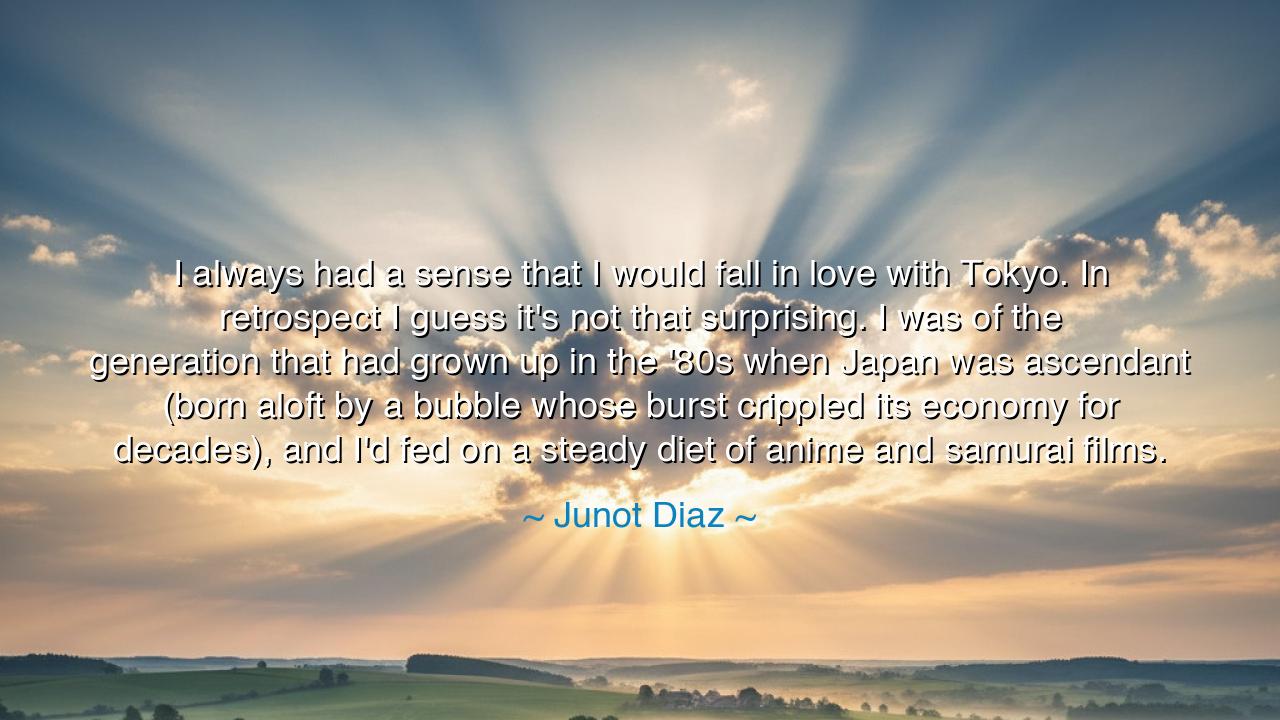
I always had a sense that I would fall in love with Tokyo. In
I always had a sense that I would fall in love with Tokyo. In retrospect I guess it's not that surprising. I was of the generation that had grown up in the '80s when Japan was ascendant (born aloft by a bubble whose burst crippled its economy for decades), and I'd fed on a steady diet of anime and samurai films.






In the reflective words of Junot Díaz, there breathes a quiet nostalgia, both personal and cultural: “I always had a sense that I would fall in love with Tokyo. In retrospect I guess it’s not that surprising. I was of the generation that had grown up in the ‘80s when Japan was ascendant (born aloft by a bubble whose burst crippled its economy for decades), and I’d fed on a steady diet of anime and samurai films.” To read this is to feel not only his love for a place, but the recognition of how deeply our imaginings shape our reality. His affection for Tokyo is not an accident—it is the fruit of a long fascination, nurtured by stories, images, and the mythic allure of a civilization that once stood as a beacon of mystery and modernity.
When Díaz speaks of being “of the generation that grew up in the 1980s,” he recalls a time when Japan stood at the pinnacle of global innovation and cultural influence. To the world, Japan appeared as a realm of paradox—a place where ancient tradition coexisted with futuristic brilliance. Its cities gleamed with neon and discipline; its art, from samurai tales to anime, carried both elegance and intensity. For a young mind, such as Díaz’s, these stories were more than entertainment—they were windows into a world that seemed to transcend the ordinary. He, like millions of others, was nourished by this vision, and his heart, shaped by those images, naturally turned eastward in affection.
But Díaz’s love for Tokyo is not merely about geography—it is about the power of cultural imagination. The ancients understood that what we love is often what we have dreamed long before we encounter it. Just as the Greek scholars once gazed toward Egypt, marveling at its temples and wisdom, or as the Renaissance artists looked toward Rome, seeking the soul of beauty, so too did Díaz and his generation look toward Japan. They were drawn not only to its cities but to the idea of it—to the harmony of form and discipline, the quiet honor of its heroes, and the wonder of its artistry. In this way, Japan became not just a country, but a symbol—a mirror reflecting the aspirations of a world in awe of progress and poise.
The “bubble” he speaks of—the great economic surge of Japan’s 1980s—was itself a legend in the making. For a time, it seemed as though Japan might surpass all others, redefining what civilization could be. Its culture, exported through technology, film, and animation, enchanted minds across the globe. Yet, when the bubble burst and the nation entered decades of stagnation, the world learned a quieter truth: that no ascent is eternal, and that even the mightiest economies are bound by impermanence. Here, Díaz’s words echo an ancient theme—the cyclical nature of fortune. The Japanese people, like the phoenix of old, endured loss with dignity, rebuilding their lives in humility and grace. And perhaps this resilience, this quiet endurance, is what deepened his affection most of all.
In every age, humans fall in love not just with places, but with ideals—and Tokyo, in Díaz’s imagination, represents both. To him, it is the embodiment of contrasts: modern yet ancient, disciplined yet creative, stoic yet filled with beauty. His love is not blind; it is aware of history, of fragility, of the shadow beneath the light. This makes his affection purer, wiser—a love not for illusion, but for the human spirit that endures beyond both glory and failure. As the ancients would say, to love something truly, one must see both its perfection and its cracks, and still bow before it in reverence.
Consider the story of the samurai, who devoted their lives to mastery and honor, knowing that every victory could be undone by fate. Their lives, like Japan’s own modern journey, were defined not by triumph alone, but by the grace with which they faced decline. The samurai’s spirit, immortalized in art and story, teaches that beauty is not found in permanence, but in devotion—in giving one’s whole heart to what is fleeting. Díaz, who once fed on tales of their courage, now recognizes that same beauty in the living pulse of Tokyo—a city forever renewing itself amidst impermanence.
And so, his words offer a lesson for all who listen: that our obsessions are not trivial—they are the seeds of connection between our inner worlds and the greater universe. What we read, watch, and dream of shapes what we come to cherish. To fall in love with a place, a culture, or an idea is to discover a piece of ourselves reflected in it. But love, as Díaz learned, must be tempered by understanding. It must mature from fascination into respect, from fantasy into truth. For the things we love most deeply are not perfect—they are human, and therefore divine in their imperfection.
Thus, let us remember: to love something deeply, one must first see it clearly. Whether it be a city, a culture, or a dream, let us not love blindly, but with open eyes and reverent hearts. Like Junot Díaz, may we honor the stories that shaped us, yet also recognize the living realities behind them. For in doing so, we learn the greatest wisdom of all—that love, when grounded in truth, transforms both the lover and the world that is loved.






AAdministratorAdministrator
Welcome, honored guests. Please leave a comment, we will respond soon